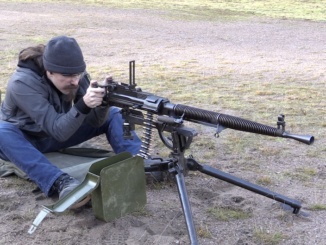A decent number of C96 Mauser pistols were present in Finland’s civil war, many of them coming into the country with the Finnish Jaegers, and others from a variety of sources, commercial and Russian. They were used by both the Reds and the Whites, and in both 9x19mm and 7.63x25mm. After the end of the civil war, when the military was standardizing, the C96s were handed over to the Civil Guard, where they generally remained until recalled to Army inventories in 1939. They once again saw service in the Winter War and Continuation War, and went into military stores afterwards until eventually being surplussed as obsolete.
One of the interesting aspects of Finnish C96s is that many of them come from the so-called “Scandinavian Contract” batch (for which no contract has actually turned up). These appear to be guns made in 7.63mm that were numbered as part of the early production in the Prussian “Red 9” series, probably for delivery to specific German units or partner forces during World War One.




Finland’s military history with regards to the Prussian Jager tradition is fascinating, as well as a bunch of the other stuff Finland took up from the Germans. Their education system is also based on the Prussian reforms of the von Humboldt brothers, and they’re nothing like the sad caricatures we have for “Rigid Prussian education/discipline”.
Raw fact is that most of that idee fixe comes straight out of British WWI propaganda (and, earlier…) and the distortions that were made by various education “reformers” here in the US. If you want “Prussian rigidity” in education, you’d be far better off looking at the French, whose ideal was that their schools should all be teaching the same subject on the same day at the same time, across France and its colonies.
It’s one of those really puzzling things; people look at the evidence of all that economic competitive prowess in Germany before WWI, and the performance of their armies, which were all based on a very flexible and adaptable culture, then say “Oh, the Germans were such rigid disciplinarians and thinkers…”. I mean, for the love of God, the Germans were the ones who adapted the French Captain André Laffargue’s work (apparently, captured in pamphlet form during a trench raid…) and turned them into their own Stosstruppe tactical system…
Meanwhile, anyone doing anything even remotely similar on the Allied side was more-or-less ignored. Who was the more flexible, again? Who was more rigid and authoritarian?
The conventional wisdom on this issue is way off the actual reality.
And, the Prussian Jager units were at the forefront of this sort of thing, being some of the finest skirmish and infiltration troops of the war. The Finns got sent to them for a reason, and their influence is there in the Finnish military to this day. Although, they spell it differently… Jääkärit.
It’s an interesting thing, the whole Jager, Rifleman, chasseurs à pied (France), Caçadores (Portugal), and Bersaglieri (Italy) movements in their various nations. All of them turned out to contribute rather more to modern tactical thinking than many of us realize, and yet are not studied or documented all that well. It’s notable that the most successful French units in WWI were also some of these troops, the Chasseurs Alpin.
All of these units deserve more study and notoriety than they get, which is sad. It’s a forgotten piece of our tactical heritage.
The Finns carry on the tradition with damn near their whole army, which is nice. Their education system also continues a lot of the traditions, which is also a big part of why its so good… Finnish doctoral students still receive swords along with their diplomas, which is seriously very cool, in terms of keeping traditions going.
Lots of fascinating stuff is embodied in that pistol and its history.
Well written and informative. Maybe the rubes who post here will learn something.
If you want to see real inflexibility, the Wonka Prize winners were always the French. (Sorry, Ian.)
There’s a story (possibly apocryphal) re the Franco-Prussian war (1870-71). Dr. Richard J. Gatling was in France as sales rep for Winchester (true), selling surplus Civil War hardware like Spencer cavalry carbines (true).
At one point he noticed French troops marching along railway right-of-ways, being passed by supply trains which were running empty going the same direction.
When he asked a French general why they didn’t load the troops onto the trains to get them to the front faster and less worn out, said general supposedly bristled and snapped, “The French soldier knows how to march! Unlike you soft Americans.”
Gatling did comment that after four years of war, American soldiers did in fact know a thing or two about marching.
Also, seeing French troops marched and countermarched back and forth with no apparent purpose, he commented that “The French general staff seems to regard this war as little more than an excuse for grand parades, and France herself as merely a vast parade ground.”
By comparison, on the Prussian side von Moltke pere’ early on issued an order; Anything which can be moved by railway, shall be moved by railway. He had studied the Union Army’s use of the North’s railways during the Civil War and adopted the idea that mobility could make up for lack of numbers if you could move troops around fast enough. Also, troops which rode to the front fought more effectively than ones exhausted by fifty mile or more marches to get there.
Prussian and German flexibility of thought and willingness to try new ideas was to give all of Europe a nasty shock twice in the 20th Century.
If you want to see just how anal the French could be, read The Guns 1914-1918 by Ian V. Hogg (Ballantines Illustrated History of the Violent Century series # 27, 1971), specifically the chapter about the French military mission’s interference in U.S. production of the French Model 1897 75mm medium gun, as well as their attempts to “improve” U.S. army artillery training SOP.
Most U.S. officers involved ended up wishing they could simply hang the French ones and get on with the job.
clear ether
eon
What’s so sucky is that there are innumerable times where the French were first on deck with being adaptable and innovative, but… Someone from “on high” put the kibosh on the whole thing. Laffargue has dozens of analogs all across French history, guys who saw things clearly, came up with solutions… And then got roundly rejected and/or utterly ignored.
Based on what my life experience and a hell of a lot of reading and study tells me, I lay it off to one primary thing: The incredible and incessant worship of the grande école tradition in French society. If you’re not a graduate, you’re not worth listening to. If you are, then of course, you know all!!
And, I’m afraid to point out, that as often as these educational edifices get things right, the track record for them and their graduates getting them wrong is pretty ‘effing spectacular. You’ll never get any admission on that, from them.
There are two things I find… Mmmm… Interesting? Yes, that’s the word… Interesting: One, that the French people still take anything these collective idiots pronounce upon as being at all credible, and that two, we here in the US (and, elsewhere…) have taken up so much of this selfsame failure culture.
Look, I get that education is a good thing. I honor scholarship and all the rest; I come from a family background of highly educated people. However, comma… The education we’re doing today isn’t the classical education of the past, wherein you were taught how to think. Today, from what I can tell dealing the average graduate, they’re teaching them not how, but what to think, and leaving it at that. They don’t even bother to cover any of the opposing evidence for “the other side”, they just teach their victims that which is the current agreed-upon shibboleth.
I am not au courant with what the French institutions have been teaching down the years, but from the evidence, I suspect that there’s been a whole lot of academic groupthink going on, and that they’ve inculcated that whole “cult of the expert” rather than teaching how to attain and operate with an open, pragmatic mind. We’ve made a similar mistake, and I’ll note that the doctrines and teachings of the actual Prussian ur-educators, the von Humboldts, were in direct opposition to this mentality. The US adopted far too much of the failed French processes and procedures, there at the beginning of the 20th Century, both in the military and in the educational realm. Men like Dewey and Mann claimed they were adopting the Prussian methodology, but what they really went for was actually more French than anything else. When you look at it, you have to wonder if they didn’t find the authoritarian French pedagogy more comfortable, and just used “Prussian” as the window-dressing for public consumption. After all, weren’t we in the habit of aping whichever European power was on the ascent, back in those days…? Witness all the Napoleonic foofawery during the Civil War, like the Zouaves and the attempts at Napoleonic column tactics that got so many killed at Gettysburg… In the late 19th, Germany had better PR, so we copied their uniforms (ever see the US picklehaube helmets we had for awhile…?) and all the rest.
Of course, as per the usual, they copied the forms but not the functions. Somehow, everything the US adopts from abroad gets taken up in appearances only, without really taking up the substance. Or, when we do get the substance, we don’t quite get it right…
I’ll lay it down to “We’re just not that good at copying things, and we ought to lay off and roll our own…”
About the only thing American education took from the Germans was the concept of Sitzfleisch, literally “sit-flesh”. Whoever could sit in a classroom and parrot back everything the professor said perfectly got an A. Degrees were therefore based on slavish devotion to dogmas handed down from On High, as you stated.
Heinlein deconstructed this viciously and accurately in The Number of the Beast (1980), when Zeb is explaining how he got a degree by doing completely meaningless and bogus “research”. I have heard of and seen worse examples IRL, the difference being as Jake said it wasn’t able scholars like Zeb doing it, but rather humorless young idiots learning advanced methods of button-counting from humorless old ideologues.
What that got us was the present “managerial elite'” that runs everything in our society today. People with no actual practical knowledge who believe that they can “manage” anything and everything without needing to actually know anything about whatever they are in charge of. They are Managers and are not to be questioned.
That’s how you end up with airliners losing important pieces in midair. Or for that matter the XM8 rifle. Or EVs that self-ignite.
Our civilization is entirely too complex to be left in the hands of “experts” whose only skill set is “management”.
Walter Russell Mead had this to say about that just yesterday;
https://www.tabletmag.com/sections/news/articles/twilight-wonks-walter-russell-mead
The problem is, as he points out, that this self-anointed “ruling class” will not go quietly.
cheers
eon
I think there’s a lot to be said about the failure of the experts, and it’s not just a recent phenomena. You go back and look, do some careful reading, and you find it all across the histories that cover periods where “things went wrong”.
History of small arms is replete with it, and what is interesting is the “continuity of error” when it comes to these things. All the experts have decisively concluded that the ideal infantry cartridge is something around 6.5-7mm and with a powder charge just big enough to enable firing the round on controllable full-auto from an individual weapon. Yet… Where the hell do you see something like implemented or adopted…? Closest we’ve come is the .280 British, and we all know how that worked out.
The “experts” keep coming back with failed ideas. France? Mitrailleuse? That ring any bells? Sure, they maintained operational security for the first really useful machinegun, but at the cost of employing it successfully. Time after time, we find these cases where the “experts” screwed the pooch, and yet… They’re still the hallowed “experts” we have to listen to. Why?
I’ll maintain until my dying day that we’re doing this wrong: Every situation needs to be approached with a spirit of open-minded pragmatism: Is what we’re trying to do here working? If not, why not? Can we work out why it failed? Then, correct it until it does and go on.
Anyone remember Jerry Pournelle and the valiant attempts he made to get something like SpaceX off the ground with the whole SSX/DCX program? How that idea of iterative failure died on the vine with NASA? We could have had something like SpaceX going as early as the 1980s, what with the improvements in miniaturization and computing… But, we did not. Why? Because it wasn’t the approved-by-expert path.
Pragmatism will overwhelm expertise, every time. Usually because the “experts” are only expert at what already exists; they’ve got nothing to contribute in the way of new things or things that work better, because they’re not innovators so much as they’re conservators.
Getting through our current moribund establishment is going to be a problem, but their ohsoveryobvious failures are going to make it impossible for them to maintain their authority.
The situation is quite analogous to many leadership situations in the military; authority derives from three basic sources in the services: Positional, expertise, and a third that’s not often mentioned in the official literature, credibility/charisma. Positional authority derives from your ranking in the hierarchy; expert authority derives from your supposed expertise at doing things, typically something that is assumed during initial credibility-building with subordinates, and the third one is something that is either a natural in-born talent or demonstrated over time with the specific people you work with.
Issue we have with society-at-large, these days, is that the people in charge are not demonstrating any of these qualities. They either fix that themselves, or they’re going to be replaced by people simply ceasing to pay attention to them… It’s a lot like the internet; bad information gets routed around.
As one of “the rubes who (rarely) post here”, I will say that I truly enjoy most of the comments, perhaps especially those by ‘Kirk’, and the attendant conversations his posts generate. Thank you all who post comments, I do enjoy reading them and often being educated beyond Ian’s videos.